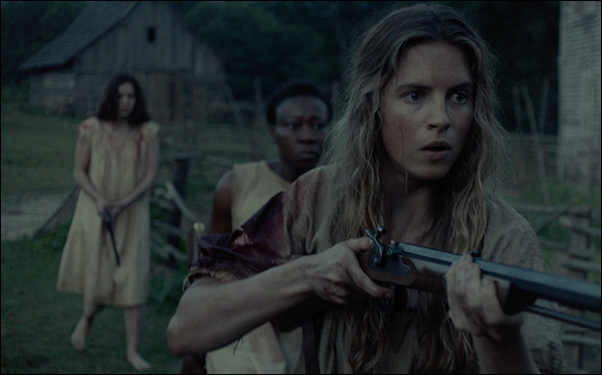“What if it’s the end of the world and we’re the last ones left?” asks Augusta (Brit Marling) over a bottle of moonshine with her slave Mad (Muna Otaru) in an early scene in “The Keeping Room.” It’s a question that may have been left politely unanswered by Mad a short time before the film begins in the final days of the Civil War, but now skin color won’t save you when everyone’s survival is at stake in the vast wilderness of the devastated American south, not to mention the effect the booze has had in making them equals.
Race, and the diminishing hold it has on the characters that populate “The Keeping Room,” is just one of the interesting wrinkles that adds to the suspense of Daniel Barber’s second feature, a slow-burning drama that is freed up because of its setting to draw on the best qualities of a variety of different genres – an intimate drama, a western and a siege thriller – to become something boldly individual. The same could be said to describe the three women it follows — Augusta, the makeshift matriarch of the trio who’s good with a rifle, her younger, easily impressionable sister Louise (Hailee Steinfeld), and Mad, who, while devoted to the only quasi-family she’s ever known, begins to reluctantly embrace the idea of serving herself as much the others.
Having accepted that all the men who worked the land have gone and died in battle, the three lead a quiet life on a farm, but after Louise suffers a leg injury, Augusta must ride to the nearest town for medicine, drawing the attention of fraternal Yankee stragglers Moses (Sam Worthington) and Henry (Kyle Soller), who are raping and pillaging their way towards somewhere they can call their own, taking advantage of these uncertain times. While Augusta makes it back home to treat Louise’s wound, she can’t be certain she wasn’t followed, if not by them, anyone who might attempt to overpower the women to take their property.
You can see why Barber got the call for “The Keeping Room” once the third act hits, resembling the vengeful, violent finale of his debut “Harry Brown.” Whereas it was a kick to see a prim Michael Caine mercilessly mete out justice to the ignorant young’uns, seeing Marling and company protect what’s theirs by any means necessary has a similarly subversive element to it, albeit with more gravitas thanks to Julia Hart’s sensitive script. Each of the women don’t exactly know what they’re fighting for since it seems all is lost even if they’re successful, and though they’re inextricably linked, they are very different people with very different outlooks and aims. The all-too-rare female perspective on this particular era also gives the action a distinctive edge, both psychologically in terms of character motivations, and physically, such as when Augusta thinks nothing of yanking off her blouse to douse a housefire to stop it spreading further.
“The Keeping Room” is handsomely mounted, with the kind of high-end, bleakly beautiful cinematography that is now common amongst period productions, but it’s the performances that make it shine. Marling, in particular, was an inspired choice to play Augusta, bringing her ethereal sense of calm to the ensuing chaos and is unquestioned as a natural leader, even looking quite comfortable with the ridiculously large rifle she carries throughout.
Otaru also appears to be emboldened by her first major role, giving a forceful but never forced performance that organically shows Mad’s transformation from a timid yet talkative housekeeper to someone who grows more quiet as she recognizes her own strength. Although Soller gets stuck with a stock bad guy in the impulsive, wholly amoral Henry, “The Keeping Room” offers far more nuanced roles to Worthington and Steinfeld as the conflicted and desperate Moses and the vulnerable Louise, respectively, and it’s clear both actors dug deep to play them, commanding the type of attention that the film demands as a whole.
When Moses tells Augusta at one point, “Something about you makes me want to sit down,” it isn’t just a come on, but a description of the whole endeavor.
“The Keeping Room” opens in select theaters on September 25th.





Comments 2